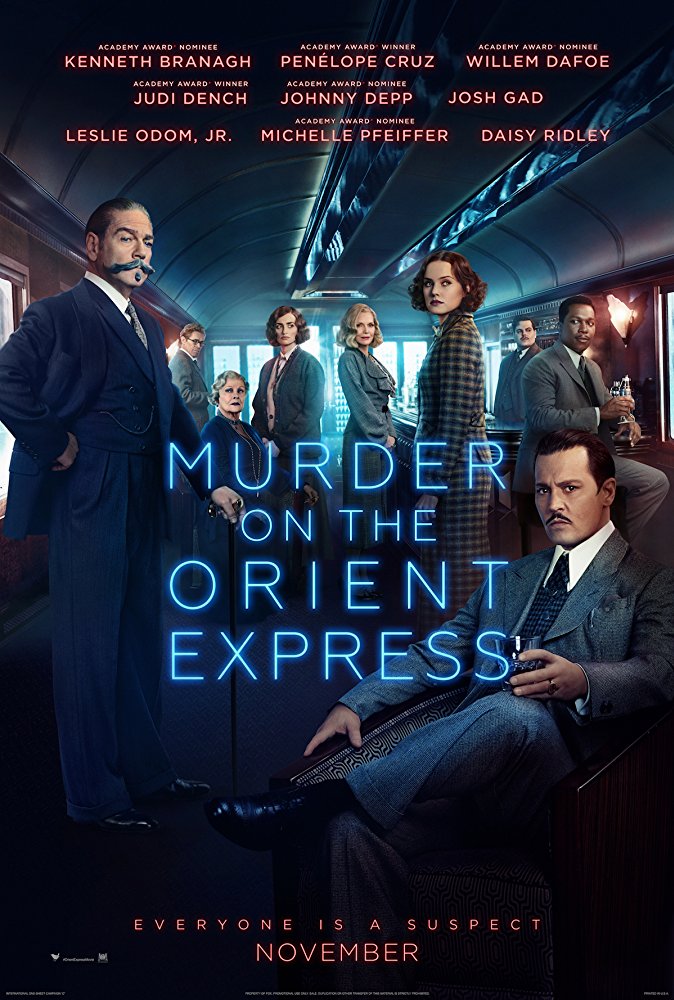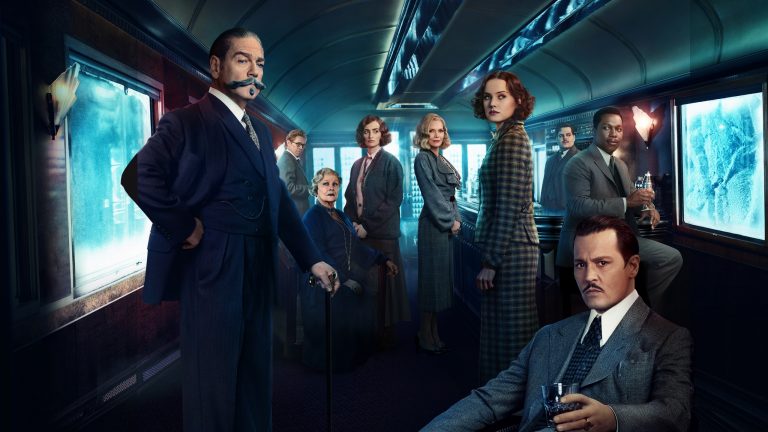Murder on the Orient Express (2017)
GOING IN
In all my years of devouring classic literature, I never read a single Agatha Christie novel. A travesty, I know. Arguably her most famous work, Murder on the Orient Express features the famous reoccurring detective Hercule Poirot. The story tells of thirteen stranded strangers on a luxurious train ride, one of them a murderer who Poirot must discover and stop before they kill again. As intriguing as the story is, I’ve intentionally avoided reading the novel or seeing the 1974 film that came before, and therefore will be able to go into this mystery spoiler-free. Branagh’s work is never short on panache and the all-star cast assembled points to an exciting cinematic game of whodunit, reminiscent of the board game Clue.
COMING OUT
For me, the success of movie mysteries is largely measured by the answer to two questions: “was it entertaining” and “did it keep me guessing until the end? ” Unexpectedly, the film is very much not a thriller. The style is theatrical in nature, which should be no surprise with Branagh directing, combined with some modern stylish cinematography. It felt very much like Branagh’s tone in Cinderella and made for a weird experience, which to be honest, did not always work for me. At many times I expected the energy of the film to increase as suspects were considered and the investigation grew nearer to resolution, but aside from one or two scenes this felt more like a stage play minus the heightened drama. And that leads into question number two, because despite not knowing the story and end result, I was certainly not guessing until the end. I’ll admit that I did not know every detail until Poirot’s classic reveal speech, but the clues were easy enough to read that it felt more like I was watching to discover how the detective would deal with the outcome versus whether he would learn the truth or not. The “whodunit” simply wasn’t filmed in such a way that lived up to my expectations for an exciting mystery and at times was downright boring.
So far, by my standards, Murder on the Orient Express does not succeed. What saved the experience for me, however, was the story itself. Though I don’t feel like this is a great adaptation, I was definitely intrigued by the moral implications that arose once the killer’s identity was revealed. The questions about justice, and what is right versus wrong, were compelling and it is easy to see why this is one of Agatha Christie’s most beloved stories. Talking through the implications of the ending on the drive home with my 14-year old made for great conversation.
With regards to the stellar cast, I feel a bit cheated. We simply don’t get enough time with each of the many characters to establish much of a connection. The acting is fine, although I’m quite tired of Johnny Depp as a gangster at this point, but no one really stands out because all of the characters are equal and overshadowed by the hero detective. Branagh really just can’t help himself here and his camera keeps Poirot in focus in almost nearly every scene. Those he isn’t in are filmed from his perspective. There are so many closeups and monologues that the film starts to feel much more about him and less about the mystery. Branagh is no doubt a stellar actor and his presence serves the character well, but his direction creates an unevenness to the style in Murder on the Orient Express that makes it feel awkward.

Verdict
I’m glad that I now know the story of Murder on the Orient Express. Christie’s tale is fantastic and is a unique scenario in murder mysteries. It brings up questions about justice, judgment, and forgiveness. Branagh’s adaptation is good, and I don’t regret seeing it, but instead of wanting to re-watch it, I am more compelled to seek out the source material and previous adaptations. Murder on the Orient Express is just an okay film. You can see better, but you could also see a whole lot worse.
Rating:
 Aaron White is a Seattle-based film critic and co-creator/co-host of the Feelin’ Film Podcast. He is also a member of the Seattle Film Critics Society. He writes reviews with a focus on how his expectations influenced his experience. Follow him on Facebook and Twitter to be notified when new content is posted.
Aaron White is a Seattle-based film critic and co-creator/co-host of the Feelin’ Film Podcast. He is also a member of the Seattle Film Critics Society. He writes reviews with a focus on how his expectations influenced his experience. Follow him on Facebook and Twitter to be notified when new content is posted.



